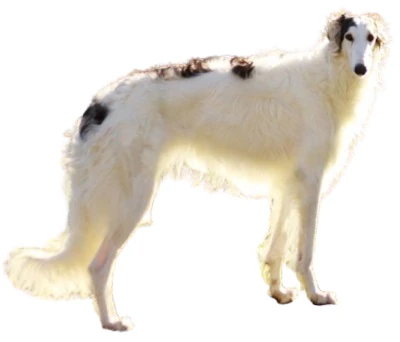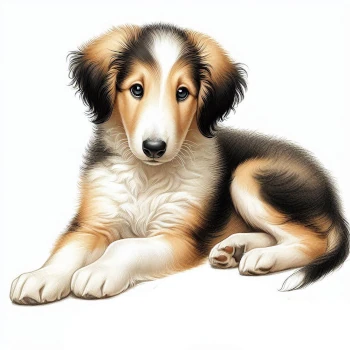
The Borzoï, also known as the Russian Wolfhound, is an elegant and aristocratic breed of dog originating from Russia. Known for its speed, grace, and distinctive coat, the Borzoï is both an excellent hunter and a loyal companion.
Physically, the Borzoï is a large dog, with males typically standing between 75 and 85 cm at the shoulder, while females stand between 68 and 78 cm. Their weight ranges from 34 to 48 kg for males and 27 to 41 kg for females. Their body is long and slender, with well-defined muscles that reflect their agility and strength. The Borzoï's head is long and narrow, with a fine muzzle and powerful jaws. The eyes are large, almond-shaped, and dark-colored, conveying a gentle and intelligent expression. The ears are small, thin, and lie back on the head, but they perk up when the dog is alert.
The Borzoï's coat is one of its most distinctive features. It is long, silky, and wavy, with a fine texture that can form curls or waves. The coat can be of any color or combination of colors, although common colors include white, black, fawn, and brindle. Regular grooming is necessary to maintain the coat's beauty and health, preventing tangles and mats.
In terms of personality, the Borzoï is known for its calm, gentle, and dignified temperament. It is very attached to its family and shows a great deal of loyalty and affection. Although it may be reserved with strangers, it is generally not aggressive. Its independent and sometimes stubborn nature requires gentle but firm training. The Borzoï is intelligent and sensitive, making it receptive to positive reinforcement-based training methods. It is also very calm indoors but needs plenty of exercise outdoors to expend its energy and satisfy its hunting instincts.
The Borzoï is generally a robust breed, but like all dogs, it can be prone to certain health issues. Common conditions include hip dysplasia, eye disorders, and heart problems. A balanced diet, regular veterinary care, and appropriate exercise are essential for maintaining overall health. Due to its long and dense coat, it is also important to regularly check for parasites and maintain good hygiene.

The Barzoï Puppy has a gentle and affectionate temperament, showing particular attachment to its family. Intelligent and sensitive, the Barzoï requires early socialization to adapt well to different environments. Its long, silky coat requires regular maintenance to prevent tangles, and it thrives in open spaces where it can run freely.
The price of a Barzoï Puppy generally ranges between 1,000 and 2,500 euros. Puppies from champion lines or renowned breeders can command higher prices, depending on the quality of the pedigree and health tests. Costs may also fluctuate based on region and demand.
Training a Borzoi puppy requires patience and gentleness, as this breed is sensitive and reactive. Socialization is crucial to help your puppy get used to various environments and interactions. Gradually expose it to noises, people, and other animals so that it becomes a balanced and sociable dog.
House training is an important step in your Borzoi's education. Use a positive and consistent method to teach it to do its business outside. Reward it every time it goes to the right place and avoid punishing it for accidents. Consistency and patience are essential in this process.
Teach basic commands like "sit", "lie down", and "come" in a fun and positive way. Use treats and praise to encourage your puppy to obey. Short, regular training sessions are more effective than a long one.
The Borzoi is an active breed that needs regular exercise to stay healthy and happy. Provide it with daily walks and play sessions to channel its energy. Activities like running or ball games will help it stay fit and develop its natural skills.
Finally, remember that each puppy is unique. Adapt your training approach according to the personality and specific needs of your Borzoi. With patience, love, and consistency, you will see your puppy grow into a well-trained and fulfilled companion.